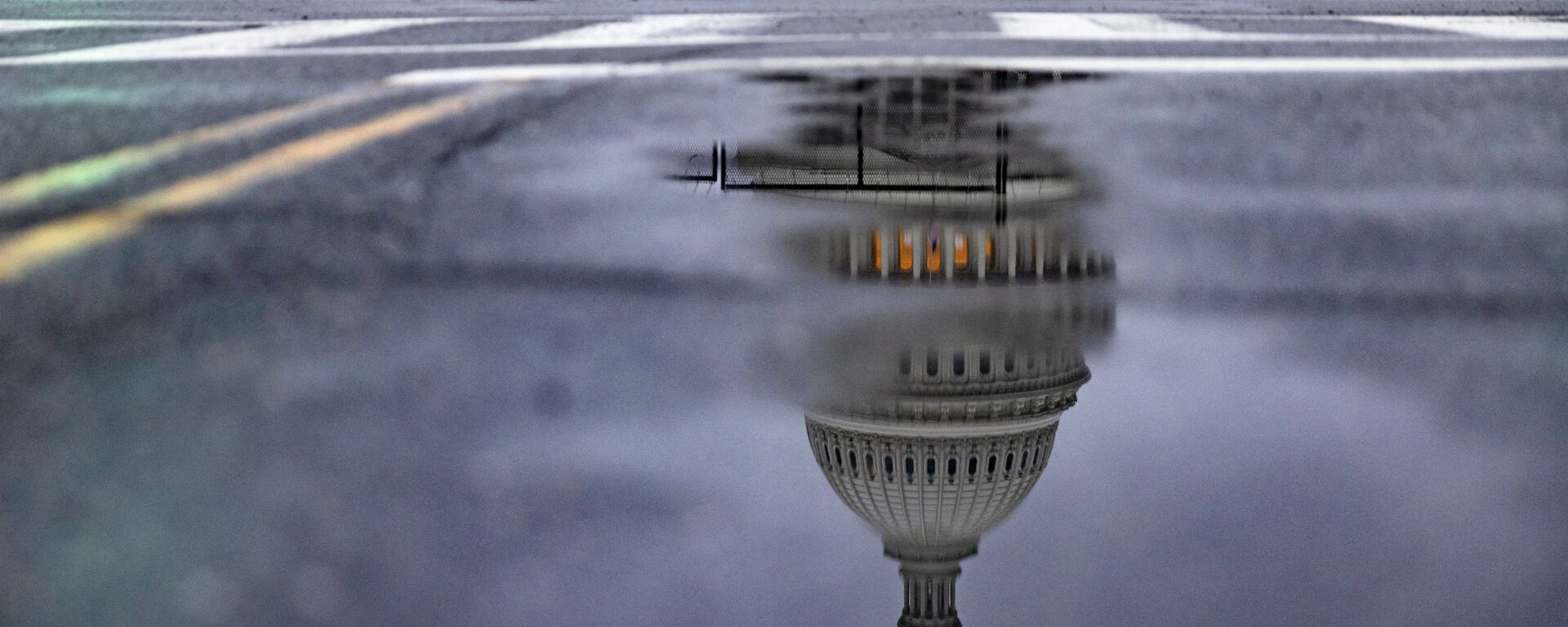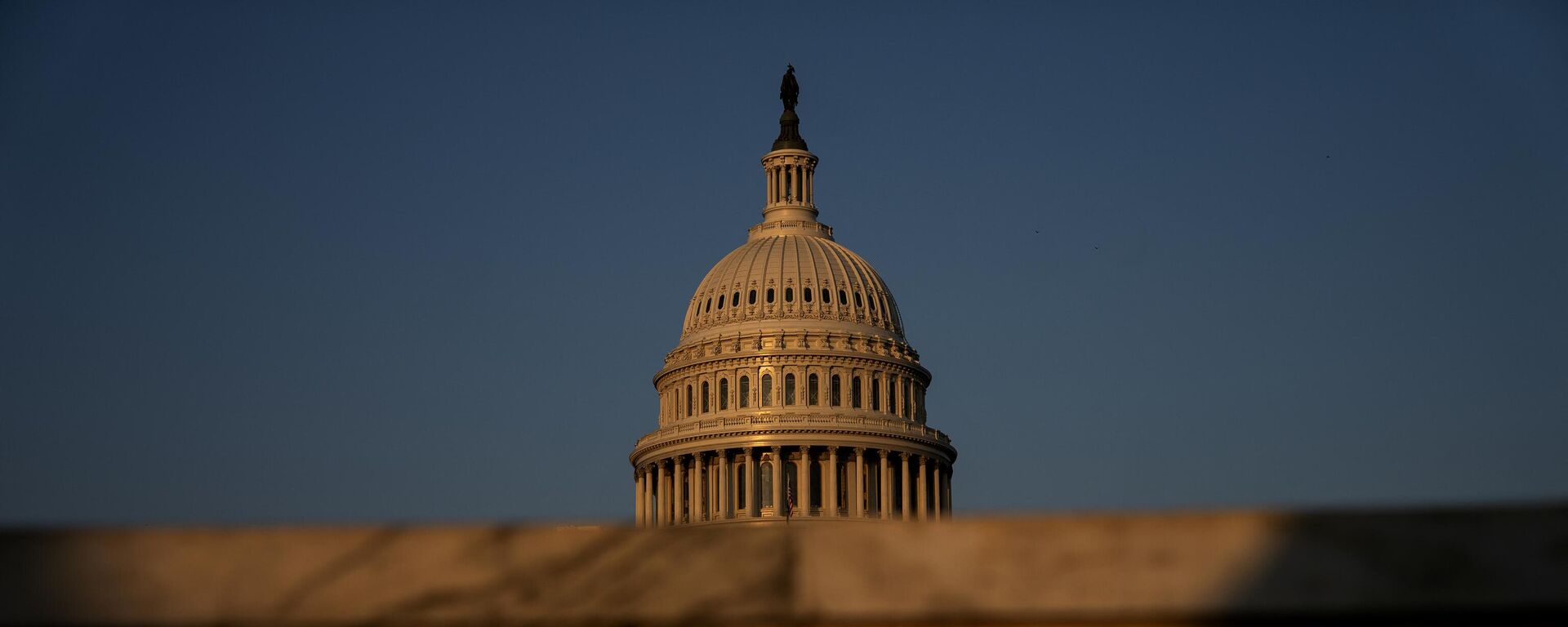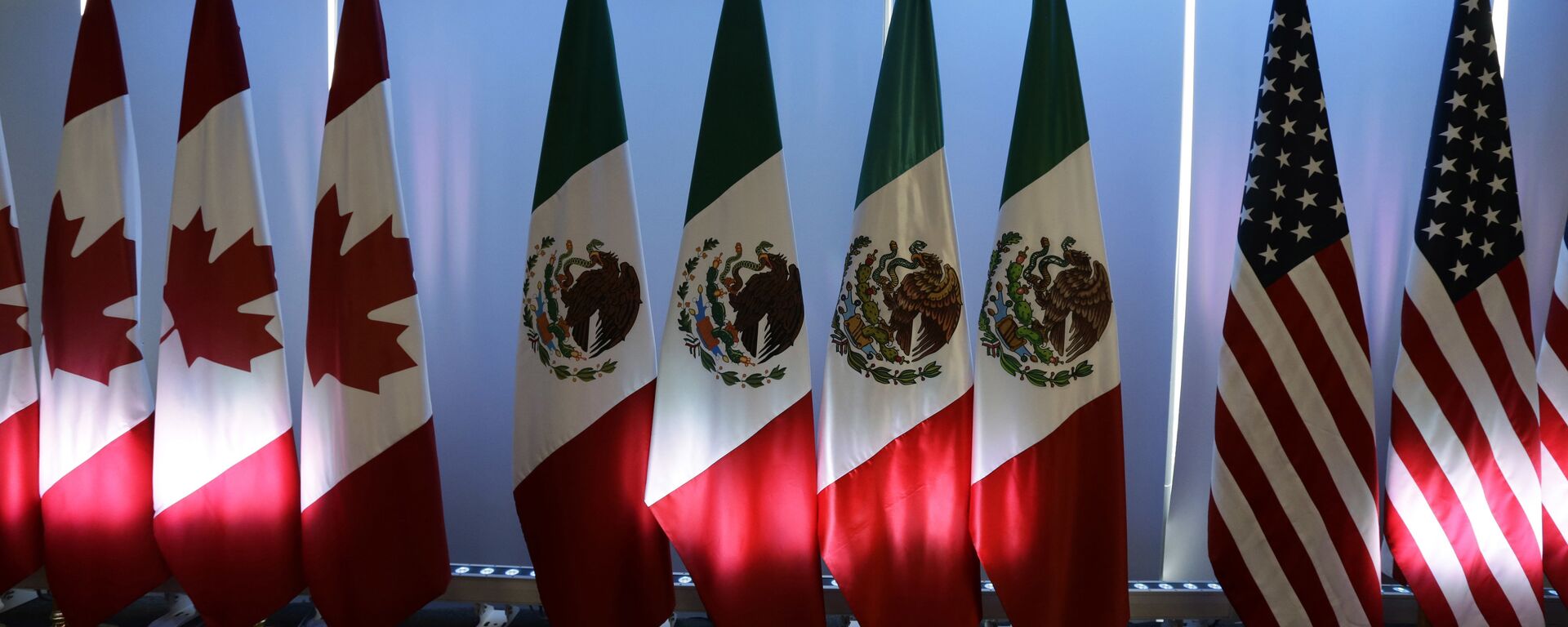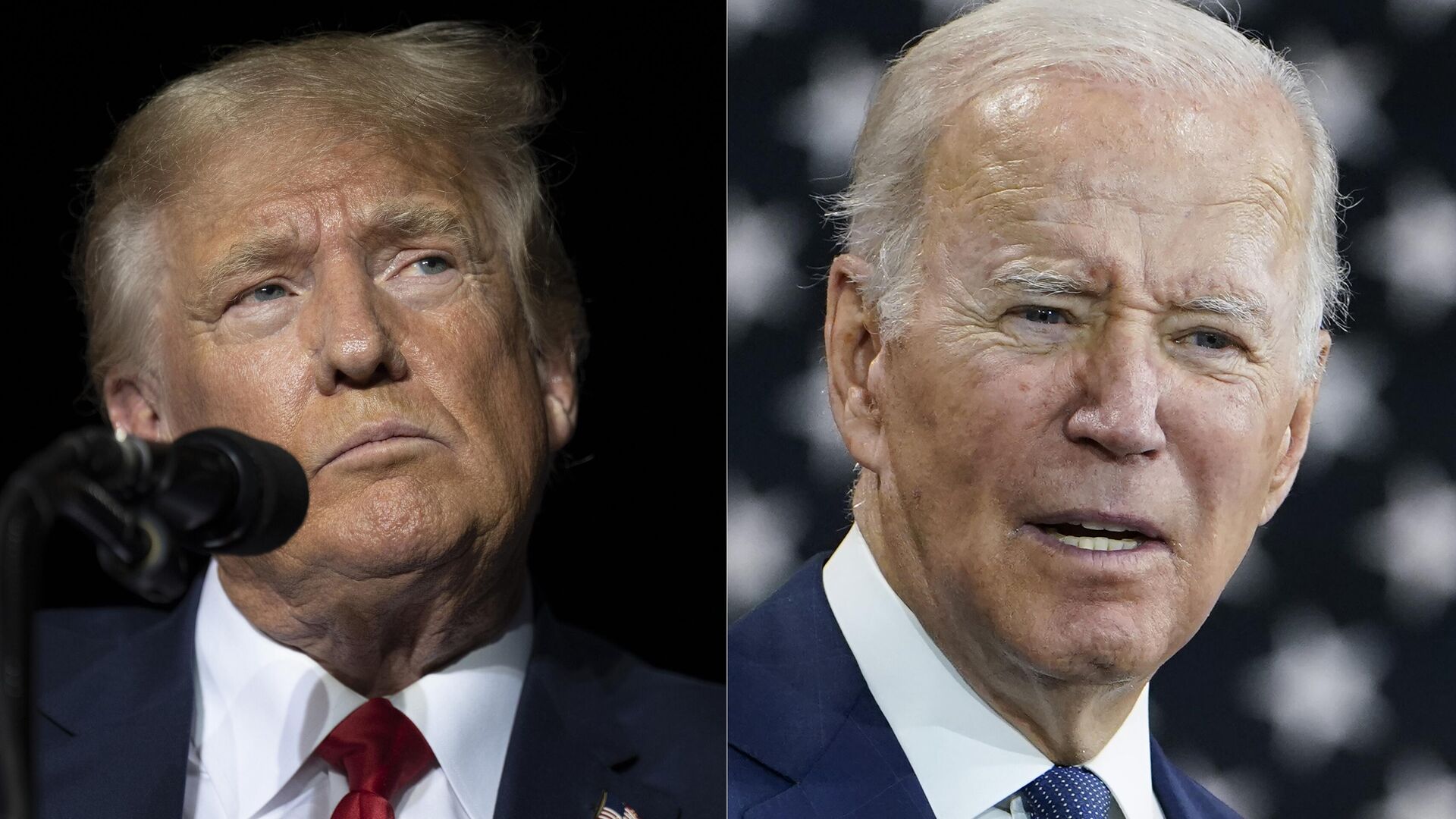https://sputnikglobe.com/20240616/record-number-of-double-haters-loathe-both-us-major-party-presidential-candidates-1118990890.html
Record Number of ‘Double Haters’ Loathe Both US Major Party Presidential Candidates
Record Number of ‘Double Haters’ Loathe Both US Major Party Presidential Candidates
Sputnik International
Polling has also revealed a growing number of Americans express a lack of confidence in US democracy amidst a broader crisis of legitimacy of US institutions.
2024-06-16T22:36+0000
2024-06-16T22:36+0000
2024-06-17T04:58+0000
analysis
us
americans
donald trump
joe biden
palestine
israel
pew research center
republican party
democrats
https://cdn1.img.sputnikglobe.com/img/07e7/04/18/1109784488_0:65:3413:1985_1920x0_80_0_0_74bac2815e1c0ba96722bf5c09b035ad.jpg
Lawmakers in Washington consistently stress the importance of exporting American-style freedom and democracy around the globe, but recent evidence suggests the United States’ system of governance has seen better days.“Biden, Trump are least-liked pair of major party presidential candidates in at least 3 decades,” declared a report by the Pew Research Center polling firm. “With the 2024 U.S. presidential election about five months away, a quarter of Americans hold unfavorable views of both major party candidates – President Joe Biden and former President Donald Trump.”Online media outlet Axios identified a number of groups making up the growing number of Americans who reject both major candidates. Among the groups are “old-guard” moderate conservatives who dislike former President Donald Trump but remain committed to the Republican Party and “techno-optimists” driven by civil libertarian concerns over issues like free speech.Perhaps the largest group of “double haters” are pro-Palestinian voters, including Arab-Americans and young people who oppose Biden’s support for Israel’s deadly military operation in Gaza. Trump also remains unpalatable for this segment of the population given the former president’s steadfast pro-Israel stance and threats to deport pro-Palestine campus demonstrators studying in America on student visas.Libertarian Party candidate Chase Oliver has also pledged to “end the genocide” against Palestinians if elected president.A number of smaller left-wing formations such as the Party for Socialism and Liberation also oppose US backing of Israel, but third party candidates typically struggle for influence and recognition in the United States’ pay-to-play political system.The last time such a large percentage of Americans rejected both US major party presidential candidates was in 2016, when a full 20% of Americans expressed rejection of both Trump and former US Senator Hillary Clinton. Since the 2016 US presidential election, both major party candidates have faced off with voter approval ratings under 50%.A substantial portion of Americans also rejected both major party candidates in 1992, with observers at the time noting the similarity between former Presidents Bill Clinton and George H.W. Bush. Both figures supported the implementation of the North American Free Trade Agreement (NAFTA) as neoliberal economic policy was embraced by the Republican and Democratic Parties alike.The development led to the entry of American business magnate Ross Perot into the race, who famously warned of the “giant sucking sound” of US jobs being shipped abroad as a result of free trade policies. Perot has been praised as “prescient” in retrospect for his criticism of neoliberal economic policy, which he cautioned would “wreck the country.”NAFTA has also been blamed for impoverish many Mexican family farmers, who were driven out of business by the import of cheap US agricultural product from the US. The free trade agreement and similar CAFTA agreement for Central America have led to a surge of immigration from Latin America as workers seek to escape economic policies and political destabilization imposed by Washington.Polling has revealed a growing number of Americans express a lack of confidence in US democracy amidst a broader crisis of legitimacy of US institutions.
https://sputnikglobe.com/20231018/growing-portions-of-americans-now-believe-democracy-no-longer-viable-system---poll-1114304414.html
https://sputnikglobe.com/20240224/lockstep-us-support-for-israel-eroding-confidence-of-americans-in-own-government-1116958270.html
https://sputnikglobe.com/20181002/nafta-replacement-usmca-1068503499.html
palestine
israel
Sputnik International
feedback@sputniknews.com
+74956456601
MIA „Rossiya Segodnya“
2024
John Miles
https://cdn1.img.sputnikglobe.com/img/07e8/01/19/1116388787_0:0:1316:1316_100x100_80_0_0_77e70d36afd983012b1c5d38ddb84156.jpg
John Miles
https://cdn1.img.sputnikglobe.com/img/07e8/01/19/1116388787_0:0:1316:1316_100x100_80_0_0_77e70d36afd983012b1c5d38ddb84156.jpg
News
en_EN
Sputnik International
feedback@sputniknews.com
+74956456601
MIA „Rossiya Segodnya“
Sputnik International
feedback@sputniknews.com
+74956456601
MIA „Rossiya Segodnya“
John Miles
https://cdn1.img.sputnikglobe.com/img/07e8/01/19/1116388787_0:0:1316:1316_100x100_80_0_0_77e70d36afd983012b1c5d38ddb84156.jpg
us double haters, rejection of biden and trump, biden trump favorability, us democracy, us crisis of institutions, us neoliberalism, us two party duopoly
us double haters, rejection of biden and trump, biden trump favorability, us democracy, us crisis of institutions, us neoliberalism, us two party duopoly
Record Number of ‘Double Haters’ Loathe Both US Major Party Presidential Candidates
22:36 GMT 16.06.2024 (Updated: 04:58 GMT 17.06.2024) Polling has also revealed a growing number of Americans express a lack of confidence in US democracy amidst a broader crisis of legitimacy of US institutions.
Lawmakers in Washington consistently stress the importance of exporting American-style freedom and democracy around the globe, but recent evidence suggests the United States’ system of governance has seen better days.
“Biden, Trump are
least-liked pair of major party presidential candidates in at least 3 decades,”
declared a report by the Pew Research Center polling firm. “With the 2024 U.S. presidential election about five months away, a quarter of Americans hold unfavorable views of both major party candidates – President Joe Biden and former President Donald Trump.”
“That is the highest share expressing negative views of both candidates in surveys conducted at about this point in the election cycle by the Center and other organizations dating back to the 1988 election.”
Online media outlet Axios
identified a number of groups making up the growing number of Americans who reject both major candidates. Among the groups are “old-guard” moderate conservatives who dislike former President Donald Trump but remain committed to the Republican Party and “techno-optimists” driven by civil libertarian concerns over issues like
free speech.

18 October 2023, 22:35 GMT
Perhaps the largest group of “double haters” are pro-Palestinian voters, including Arab-Americans and young people who oppose Biden’s support for Israel’s deadly military operation in Gaza. Trump also remains unpalatable for this segment of the population given the former president’s steadfast pro-Israel stance and threats to deport pro-Palestine campus demonstrators studying in America on student visas.
“Activists are increasingly rejecting the ‘lesser of two evils’ paradigm that historically has benefited Democrats, raising the risk that they'll boycott the election or vote third party,” Axios reported. Among prominent third-party US candidates Robert F. Kennedy Jr. has also expressed a pro-Zionist stance, but Green Party candidate Jill Stein has distinguished herself as a supporter of the Palestinian cause. The activist and physician was
arrested at a pro-Palestine demonstration in St. Louis in April.
Libertarian Party candidate Chase Oliver has also
pledged to “end the genocide” against Palestinians if elected president.
A number of smaller left-wing formations such as the Party for Socialism and Liberation also oppose US backing of Israel, but third party candidates typically struggle for influence and recognition in the United States’ pay-to-play political system.

24 February 2024, 23:26 GMT
The last time such a large percentage of Americans rejected both US major party presidential candidates was in 2016, when a full 20% of Americans expressed rejection of both Trump and former US Senator Hillary Clinton. Since the 2016 US presidential election, both major party candidates have faced off with voter approval ratings under 50%.
A substantial portion of Americans also rejected both major party candidates in 1992, with observers at the time noting the similarity between former Presidents Bill Clinton and George H.W. Bush. Both figures supported the implementation of the North American Free Trade Agreement (NAFTA) as neoliberal economic policy was embraced by the Republican and Democratic Parties alike.
The development led to the entry of American business magnate Ross Perot into the race, who famously
warned of the “giant sucking sound” of US jobs being shipped abroad as a result of free trade policies. Perot has been
praised as “prescient” in retrospect for his criticism of neoliberal economic policy, which he cautioned would “wreck the country.”
NAFTA has also been blamed for impoverish many Mexican family farmers, who were driven out of business by the import of cheap US agricultural product from the US. The free trade agreement and similar CAFTA agreement for Central America have led to a surge of immigration from Latin America as workers seek to escape economic policies and political destabilization imposed by Washington.
Polling has revealed a
growing number of Americans express a lack of confidence in US democracy amidst a broader
crisis of legitimacy of US institutions.

2 October 2018, 00:46 GMT






